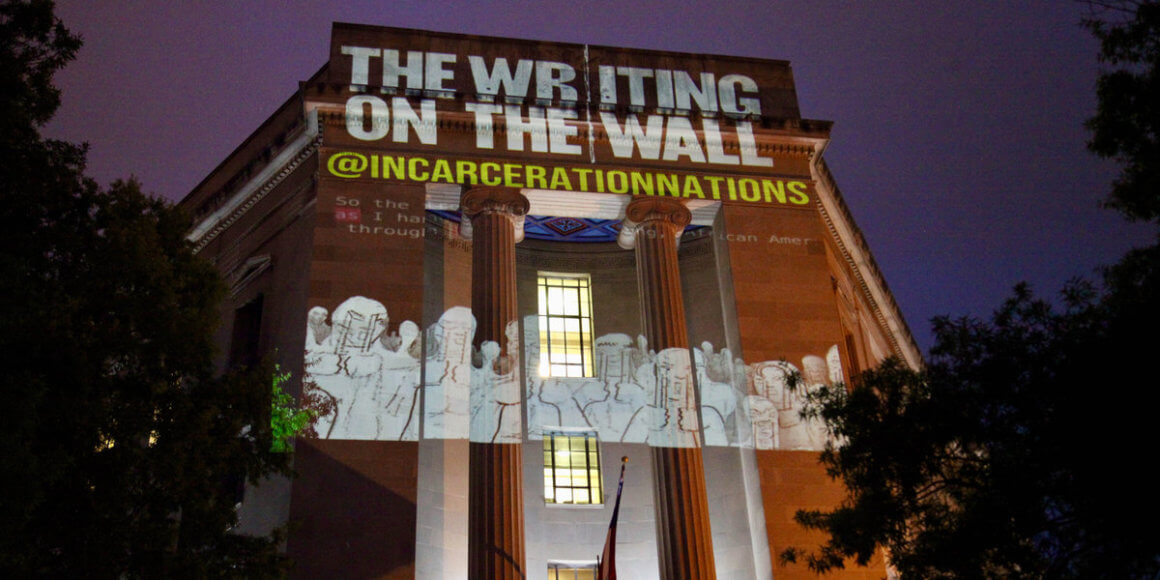Incarceration Nations Network draws attention to prisoners’ conditions around the world with nocturnal art installations in major cities
Conceived by researcher Baz Dreisinger and artist Hank Willis Thomas, The Writing on the Wall project has rocked large cities around the world. In June, the American capital Washington hosted the show, which takes place at night in large public buildings, such as museums and the United States Department of Justice. Thomas projects writings, poems and testimonies from prisoners from around the globe. The Washington event was accompanied by a live broadcast on the Incarceration Nations Network’s Instagram page and was attended by the Humanitas360 Institute. Janaina Reis, project manager for H360, commented on the situation of the pandemic in Brazil and in Brazilian prisons. Watch below:
Watch full video at Incarceration Nation Network’s Instagram account
H360 took the opportunity to send some questions to Baz Dreisinger, founder of the Incarceration Nations Network, an international network of projects related to mass incarceration of which we are part of. “We want to take budgets out of militarized policing and corrections, that do not make us safer, and invest in communities, in true public safety, in education, health care, all kinds of needs in communities. I think that’s the message that is relevant, not just in the US but around the world,” she says. Watch the video below:
Could you explain a little more to the Brazilian public about the “Writings on the Wall” project? How did you conceive it?
Greetings! I’m doctor Baz Dreisinger, executive director of the Incarceration Nations Network. So, first to share, the “Writings on the Wall” Project is a 7 year old project that is about to amplify the voice of those directly impacted by mass incarceration all around the world. Our installation, a collaboration between INN and the incredible artist Hank Willis Thomas and various other organizations who support us and what we do is take writings and drawings and notes by people in prison from all around the world and project them in public spaces. We’ve done this in a physical sense in some cities in the US – we did it on the High Line Park, in New York City, where there was a collapsible booth made of writings by people in prison around the world, that people could read, engage with, take a tour with a formerly incarcerated leader, who would share about personal experience and also ideas about police change. We used it as a way to elevate those voices, to get the conversation going, and also to elevate the work of people fighting against mass incarceration all around the world and our partners at the Incarceration Nations Network and the incredible work they’re doing. Currently, the Writing on the Wall has turned into a projection that we are projecting at night at cities in the US and soon internationally, as a way of saying that we need to pay attention to prisons in this crises.
How is the situation of the pandemic in US prisons?
Covid is a pandemic in the prisons around the world. Here in US we have over 56.000 cases in the prisons and more than 650 deaths. And the releases from prisons in the face of this have not been nearly enough. It’s critical that that happen, we’re advocating it in face of the pandemic but we’re also advocating it simply in the face of wanting to #DefundthePrisons. We want to take budgets out of militarized policing and corrections, that do not make us safer, and invest in communities, in true public safety, in education, health care, all kinds of needs in communities. I think that’s the message that is relevant, no just in the US but around the world. Defund the prisons, invest in communities.
Do you know about any countries that have taken serious measures about the pandemic and the situation in prisons?
As far as the pandemic itself that has been some radical moves taken by various countries. I recently spoke with one of our INN partners in India and I was told that 70 to 80 thousand people have been released – that is almost a quarter of the entire prison population, which is excellent. Other countries like Iran and Turkey had responded in kind. but are they going to continue to desincarcerate? Even on the other side of this pandemic, whatever it looks like, it’s critical that they do that. That they invest in alternatives to incarceration programs, also. That they invest in reentry and reintegration. In the face of the pandemic it’s really a double crisis. Wheeen the pandemic happens it’s much difficult. So we need governments around the world to invest in reentry and reintegration, as well as healthcare and other kinds of support and programs that keeps people of being funneled directly into prisons to begin with. These are the messages we’re trying to convey with the Writing on the Wall in Ohio this friday, and then Mexico City the week after that, and we’re looking forward to it.
The situation in the US with the protests and anti-racism wave really resonates here in Brazil. In the quarantine time Sao Paulo’s police killed one person every six hours, on average, mostly black people. How is this situation of structural racism connected to mass incarceration? Do you see similarities between our two countries?

